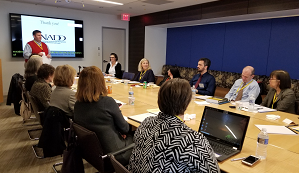Addressing National Challenges Facing Individuals with Intellectual/Developmental Disabilities and Co-Occurring Mental Illness
Share this page
On December 6, 2017, NADD with partners NAMI, ANCOR, NASDDDS and NASMPHD hosted a Public Policy Summit in Washington, DC, on “Ensuring Full Community Engagement for Individuals with Intellectual/Developmental Disabilities and Co-Occurring Mental Illnesses.” A follow-up to NADD’s 2014 Summit which focused on the topic of inclusion in health care reform, the 2017 Summit provided an expanded opportunity, with a more comprehensive representation of stakeholders, to address the national challenges facing individuals with intellectual/developmental disabilities and co-occurring mental illness (IDD/MI), and their families. In today’s rapidly changing health care and human service environments, it is critical that this Summit’s stakeholders – family members and leadership from disability organizations representing associations, providers and advocates with federal and state government agencies, private and public insurers and managed care organizations (MCO’s) – work together in achieving effective services and treatment. They all collaborated and identified recommendations and perspectives in meeting the Summit’s objective to advance the comprehensive health care and other community engagement needs of individuals with IDD-MI.
 Since the 2014 Summit, there have been individual state improvements in crisis intervention services and access to mental health services, and enhanced understanding of this population by state Medicaid directors and state mental health commissioners. Community engagement remained an ongoing and critical piece of this complex nationwide system-based puzzle. Therefore, with the planning and strategizing support of NADD’s four partners, the 2017 Summit was held. It was well attended by invited stakeholders committed to bringing about systemic policy, funding and service changes. Stakeholder participants discussed the following topics throughout the one-day Summit:
Since the 2014 Summit, there have been individual state improvements in crisis intervention services and access to mental health services, and enhanced understanding of this population by state Medicaid directors and state mental health commissioners. Community engagement remained an ongoing and critical piece of this complex nationwide system-based puzzle. Therefore, with the planning and strategizing support of NADD’s four partners, the 2017 Summit was held. It was well attended by invited stakeholders committed to bringing about systemic policy, funding and service changes. Stakeholder participants discussed the following topics throughout the one-day Summit:
- Community Living
- Knowledge, Expertise & Inter-Systems Service Coordination
- Person-Centered Services & Funding
In addressing the community engagement needs for adults and children diagnosed with co-occurring IDD-MI, participants discussed the common goal that these individuals receive the quality of care necessary for community-based living including: long-term services; primary health care; and behavioral supports. Participants reviewed successful examples from t federal, state, and local levels and discussed the issues/barriers preventing these successes from being replicated or expanded.
Participants’ reached a consensus that individuals at all levels of the community must be involved to create fully integrated community living systems of care. Efforts to increase awareness about the behavioral health needs of this population was identified as the first of many steps. Awareness and advocacy include an ongoing effort to create a desire to work on behalf of this population, encouraging additional family supports, and advocating for federal, state and private sector funding supports. Important focuses were identified: The inclusion and training of educators, first responders, medical support staff and service providers as groups of individuals who can and should receive additional training in working with and understanding this population.
Other recommendations included data sharing; improvements to affordable housing systems and technology; consistent use of terminology/language; creating and managing an online forum for sharing of success stories. These recommendations were put forward in support of information dissemination and to show how states and communities have successfully carried out these recommendations.
At the close of the Summit, NADD with its partners NAMI, ANCOR, NASDDDS and NASMPHD summarized the participants’ recommendations. These will be reviewed and studied over the coming months by the Summit’s participants resulting in a comprehensive action plan to direct next steps in order to raise standards and outcomes across the nation.
